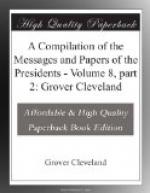and in 1816 was chosen to Congress to fill a vacancy,
serving till 1819. On March 30, 1818, Congress
unanimously voted him a gold medal for his victory
of the Thames. In 1819 he was chosen to the senate
of Ohio, and in 1822 was an unsuccessful candidate
for Congress. In 1824 was a Presidential elector,
voting for Henry Clay, and in the same year was sent
to the United States Senate, and succeeded Andrew
Jackson as chairman of the Committee on Military Affairs.
He resigned in 1828, having been appointed by President
John Quincy Adams minister to the United States of
Colombia. He was recalled at the outset of Jackson’s
Administration, and retired to his farm at North Bend,
near Cincinnati, Ohio. In 1835 was nominated
for the Presidency by Whig State conventions in Pennsylvania,
New York, Ohio, and other States, but at the election
on November 8, 1836, was defeated by Martin Van Buren,
receiving only 73 electoral votes to the latter’s
170. December 4, 1839, he was nominated for the
Presidency by the national Whig convention at Harrisburg,
Pa., and was elected on November 10, 1840, receiving
234 electoral votes to Van Buren’s 60. Was
inaugurated March 4, 1841. Called Congress to
meet in extra session on May 31. He died on Sunday
morning, April 4, 1841. His body was interred
in the Congressional Cemetery at Washington, but in
June, 1841, it was removed to North Bend and placed
in a tomb overlooking the Ohio River.
INAUGURAL ADDRESS.
Called from a retirement which I had supposed was
to continue for the residue of my life to fill the
chief executive office of this great and free nation,
I appear before you, fellow-citizens, to take the oaths
which the Constitution prescribes as a necessary qualification
for the performance of its duties; and in obedience
to a custom coeval with our Government and what I
believe to be your expectations I proceed to present
to you a summary of the principles which will govern
me in the discharge of the duties which I shall be
called upon to perform.
It was the remark of a Roman consul in an early period
of that celebrated Republic that a most striking contrast
was observable in the conduct of candidates for offices
of power and trust before and after obtaining them,
they seldom carrying out in the latter case the pledges
and promises made in the former. However much
the world may have improved in many respects in the
lapse of upward of two thousand years since the remark
was made by the virtuous and indignant Roman, I fear
that a strict examination of the annals of some of
the modern elective governments would develop similar
instances of violated confidence.




